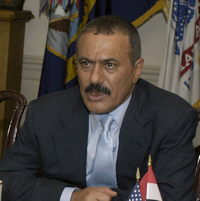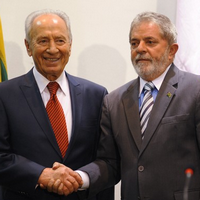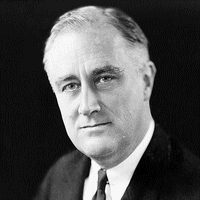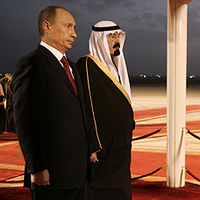Another thing about Giovanni Grevi’s notion of an interpolar world is that it seems very consistent with the Obama administration’s emphasis on a “multipartner” world.Significantly, in this context, the major objective in internationalrelations shifts from advancing individual interests toward identifyingcommon ones, in order to convince the increasing number of players thatnow wield de facto vetos to lift them. Obama seems to get the importance of this kind of consensus-building, even if his knee-jerk criticsdon’t. The most recent case in point is China’s vote at the IAEA to censure Iran, which is apparently a direct result of Obama’s allegedly “deliverables-free” China […]
Iran Archive
Free Newsletter
The IAEA has censured Iran and is demanding Tehran freeze nuclear operations at asecret facility. The stern move by the agency is a victory for theObama administration says Iran expert Ervand Abhrahamian. WorldFocus’Martin Savidge talks with the history professor about what thecensure could mean for United States global positioning among powerssuch as Russia and China.

Relations between Saudi Arabia and Iran have ranged over the years from coolly cordial to openly hostile. After all, the two countries see themselves as rivals in the quest for regional influence and for leadership of the Muslim world. They have very different histories and conflicting political ideologies, and they stand on opposing sides of the Shiite-Sunni divide. In recent months, strains in the relationship have greatly intensified. Today, the differences between Tehran and Riyadh have brought the neighbors dangerously close to open confrontation. How serious is the crisis? Consider the recent headline in the respected pan-Arab newspaper Alsharq al-Awsat: […]
Since forward-moving talks in Geneva four weeks ago, nuclear talks withIran have seriously deteriorated. WorldFocus interviews U.S.-Iranrelations expert Trita Parsi who says that changing dynamics in Tehranare to blame for the current situation and that there is little outsidefactors will be able to contribute to quell the issue. Parsi says it isnot the deal itself that is the problem, it is the fissures in Iranthat are impeding progress.
One of the consequences of the U.S. dependence on Pakistan to achieve its goals in Afghanistan is the way in which it drives India and Iran closer. That’s because their interests in Afghanistan largely converge, in opposition to those of Pakistan. It’s also obvious that U.S. interests in Afghanistan more closely align with those of India and Iran than with those of Pakistan. But to actually operationalize that would essentially turn the Afghanistan war into the Pakistan war. Clearly, the ideal solution would be for India and Pakistan to resolve their differences, and for the U.S. and Iran to do […]

Middle Eastern diplomacy has intensified enormously in recent months, but don’t expect to see peace break out any time soon as a result of that new burst of activity. That’s because the latest wave of diplomacy has surfaced in a most unlikely place: South America. In November alone, Brazil is playing host to the presidents of Israel, Iran and the Palestinian Authority. Why have these leaders, all facing pressing problems at home, suddenly decided to travel thousands of miles to spend time with the heads of developing nations? The visits are hardly routine. When Israeli President Shimon Peres landed in […]
Rights advocates are expressing concern about Iranian plans to create a cybercrimes division to investigate illegal activity on the Internet, over fears that authorities will use the unit to target the opposition and political activists. Iranian authorities say they are aware of over 100,000 incidents of cybercrimes in 2008 — including theft, fraud, forgery and libel — and that the number is on the rise. But rights advocates worry that the unit’s real purpose is to quell political discourse and enhance an ongoing crackdown on the opposition, which relies heavily on Internet-based tools for communication. After Iran’s controversial June presidential […]
President Barack Obama met with Russian President Dmitry Medvedev during an Asia Pacific summit in Singapore. Though in Asia, the leaders took time out to discuss the persisting standstill in nuclear negotiations with Iran. “We are now running out of time,” Obama said, referring to Iran’s current tacitness. Both leaders say they are prepared hold a tougher line on the matter.

It remains uncertain whether Iran will ultimately accept or reject the agreement that nuclear negotiators in Geneva drafted late last month to send Iran’s stockpiled enriched uranium abroad for further enrichment. But the deliberations in Tehran have made one thing clear: Iranian President Mahmoud Ahmadinejad is under enormous domestic pressure from all sides to reject the P5+1 deal. It would be a mistake, however, to view this pressure in the vacuum of the nuclear issue. In fact, the opposition to striking a deal with the West offers a revealing glimpse of what the future holds for Iran’s fractured political landscape. […]
This point by Flyntt Leverett and Hillary Mann Leverett about the recurring “Russia okays sanctions on Iran” meme is well-taken. For a while now, the bleak prospects on the Iran nuclear standoff have caused us to hear what we’d like Moscow to be saying, rather than what it actually is saying. That said, one thing the Leveretts don’t mention is that Russia’s recurring delays in bringing the Bushehr nuclear reactor online represents in some ways a hidden sanction on Iran.
Joshua Pollack has a very useful rundown of just what the recent mention of Turkey as an “escrow” holder of Iranian enriched uranium could look like. There’s no reason to be any more optimistic about Iran’s response to this option, compared to the deal as it now stands, even if it does remove the “trust card” from the Iranian negotiating arsenal. But given that IAEA chief Mohamed El-Baradei has explicitly referred to the Turkish option as a proposal he’s floating with U.S. approval, it might be time for Secretary of State Hillary Clinton to back off from the “no renegotiation” […]

President Barack Obama has successfully transformed America’s strategic dialogue with the world for the better in his first year, impressing Europe — or at least eminently sensible Norway — enough to win a Nobel Peace Prize. In relationship after relationship, America now finds itself talking about what really matters, which in most instances means prioritizing economics above terrorism (George W. Bush’s one-note presidency) and climate change (Al Gore’s shrill post-vice-presidency). For those who prefer a diet of constant fear, Obama’s maddeningly calm approach is not nearly as filling as an American foreign policy forever focused on perceived existential threats. The […]
Here are a few of the week’s highlights from WPR’s video section: As Germany celebrates 20 years since the Berlin Wall crumbled, some vintage footage from PBS’ NewsHour provides a look back to what policymakers and pundits of the day were thinking. From utter shock and surprise to apprehension, then-Sens. Richard Lugar and Sam Nunn, arms negotiator Paul Nitze, former National Security Adviser Walt Rostow, and former ambassador and economist John Galbraith explore what this new East Germany might look like. So, how did they do? In Cambodian Prime Minister Hun Sen’s latest dig at Thailand’s current government, Cambodia has […]
In an interview with Charlie Rose, Secretary of State Hillary Rodham Clinton provides the context for thecurrent standstill in Iran with regards to nuclear negotiations. Shesaid that the United States and the rest of the international communityexpect a favorable response to the proposed enrichment deal soon. Shecontinued by saying that she understands the domestic complications inIran that are stalling a decision, but sees this as merely a setback.
WSJ’s Jerry Seib takes a deeper look into what Iran’s indecisivenessregarding a nuclear deal says about the cohesiveness, or lack thereof,of the Iranian government. Seib believes the waffling to be indicativeof conflicting thoughts in Tehran, specifically reformers, youth andintellectuals pitted against traditionalists and older clerics. He saysAhmadinejad would like to do a deal with the West to gain the supportof intellectuals and Iran’s influential youth, but is facing resistancefrom those who want nothing to do with the West.

Saudi Arabia’s possible purchase of at least $2 billion of Russian military equipment has the potential to be the most significant Russian arms deal in the Middle East since the Soviet Union transferred SA-2s to Nasser’s Egypt. By all indications, it seems that the two countries have reached an agreement for the arms transfer, after a two-year negotiation period. The deal may be part of a larger process that leads to a significant realignment in the external relations of both parties. The arms transfer agreement, which covers a broad spectrum of weapons, is guided by the agreement on cooperation in […]
There are probably still a few more twists and turns ahead, but for now it seems as if Iran has backed out of the draft agreement to ship its enriched uranium abroad for further enrichment and processing into fuel rods. I mentioned last week that the Iranian political consensus that saw no real satisfactory options in the negotiations mirrored the view from Western capitals, and presented the makings of a mutually sub-optimal deal. But this, from the NY Times, seems to suggest that the Iranian government’s domestic room for maneuver might be even more limited than that of the Western […]
